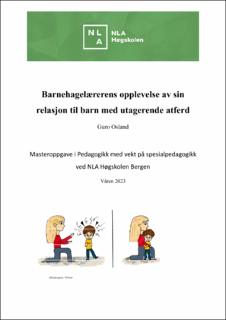Barnehagelærerens opplevelse av sin relasjon til barn med utagerende atferd
Master thesis
Permanent lenke
https://hdl.handle.net/11250/3083273Utgivelsesdato
2023Metadata
Vis full innførselSamlinger
Sammendrag
Målet med denne masteroppgaven er å bidra til større oppmerksomhet rundt den voksnes opplevelse av arbeid med barn, her spesielt barn med utagerende atferd. Den voksne opplevelse av en relasjon kan påvirke barnet, voksen-barn relasjonen og hvilken oppfølging barnet vil få. Barn med utagerende atferd er en gruppe barn jeg kan oppleve som krevende, og det er viktig at barnet får god oppfølging. Det vil være pedagogene i barnehagen som har ansvaret for barnet med utagerende atferd, derfor har jeg valgt å rette blikket mot dem. Ved å se på hvordan den voksne har det, og opplevelsen deres av situasjonen, vil man kunne få et annet innblikk i hvordan man kan hjelpe barn med utagerende atferd. Dette vil masteroppgaven se nærmere på gjennom problemstillingen:
Hvordan opplever barnehagelæreren sin relasjon til barn med utagerende atferd?
Masteroppgavens innledning inneholder en begrepsavklaring, der blir blant annet oppgavens definisjon av utagerende atferd blir beskrevet. Begrepet relasjon blir også forklart her, da dette er en sentral del av oppgaven. Forskningens teorigrunnlag er delt opp i fire ulike hovedkategorier. Dette er barnehagelærerens rammevilkår, utagerende atferd, relasjoner og personalet. Disse kategoriene er valgt basert på avhandlingens funn, og for å belyse problemstillingen.
Masteroppgavens har en hermeneutisk tilnærming, og jeg har benyttet meg av en tematisk analyse for å komme frem til forskningens funn. Forskningens metodekapittel går inn på forarbeid og gjennomføring av datainnsamling, samt etiske hensyn.
Gjennom analyseprosessen og kodene, ble funnene inndelt i følgende kategorier: Utagerende atferd, erfaringer og egne opplevelser. Forskningens funn viser blant annet en felles forståelse blant informantene for begrepet utagerende atferd. Når det blant annet gjelder opplevelsene av en diagnose, erfaringer, kollegastøtte, og krevende situasjoner, er det et sprik mellom hva de ulike informantene opplevde. Informantene opplevde det å stå i en relasjon med barn med utagerende atferd som krevende av ulik grad, likevel opplever alle det som krevende. I drøftingskapittelet blir det diskutert hvordan barnehagelæreren opplever sin relasjon til barn med utagerende atferd, og hvordan denne relasjonen kan påvirke den voksne både fysisk og psykisk. Det blir også ut ifra avhandlingens hovedfunn diskutert hvilken rolle barns fysiske utagering har i relasjonen til den voksne, og dilemmaer rundt dette. Samtidig som det blir sett på hvordan den voksnes opplevelse av relasjonen kan påvirke barnet med utagerende atferd.
Forskningen knyttet til denne masteroppgaven viser at barnehagelærerens opplevelser er utfordrende, slitsomt, både fysisk og psykisk, men også veldig givende. Funnene viser til et spenn mellom det krevende og givende, som gjør at det vanskelig å ha en tydelig konklusjon. Likevel håper jeg forskningen kan være et bidrag til videre tankegang om hvordan en kan hjelpe barn med utagerende atferd i barnehagen, og hvilken betydning fokuset på den vokses opplevelse kan ha.
Abstract:
My goal with my master thesis is to contribute to a bigger awareness towards adult’s experience with working with children, here especially children with disruptive behaviour. The adults experience of a relation can affect the child, the adult-child relation and which follow-up the child gets. Children with disruptive behaviour is a group of children I personally can experience as challenging, and it is important that the child gets a good follow up. The educator in the kindergarten is responsible for the child with disruptive behaviour, that is why I have put my focus towards them. By researching how the adult is doing, and their experience of the situation, you could get another insight in how one could help children with a disruptive behaviour. The master thesis will look closer on this through my topic question:
How does the kindergarten teacher experience their relation with children with a disruptive behaviour?
The introduction to the master thesis contains a clarification of terms, where, among other things, the thesis´ definition of disruptive behaviour is being described. The term relation will also be explained in the introduction, since this term is an essential part to my thesis. The research’s theory foundation is divided up in four main categories, which is the kindergarten teachers guidelines for work, disruptive behaviour, relations and the staff. These categories are chosen based on the thesis´s findings, and to illuminate the thesis´ topic question. The master thesis has a hermeneutical approach, and I have used a thematical analysis to derive my research findings. The research’s method chapter underlays in preliminary work and execution of data accumulation, together with ethical concerns. Through the analysis process and the codes, the findings were divided in the following categories: disruptive behaviour, experiences in the workplace and own experiences. The researcher’s findings show among other things a join understanding among the informants for the term disruptive behaviour. When it, inter alia, applies to the experience of a diagnosis, experiences, colleague support and difficult situations, there is a divide between what the different informants experienced. The informants experienced standing in a relation with a child with disruptive behaviour as challenging in different degrees, however, every one of the informants experienced it as difficult.
In the discussion chapter it is debated how the kindergarten teacher experience their relation to children with a disruptive behaviour, and how this relation can affect the adult, both physically and mentally. It is also, from the thesis´ main findings, discussed which role children’s disruptive behaviour have in relation to the adult, and dilemmas surrounding that. Simultaneously as the thesis looks at how the adults experience can affect the child with disruptive behaviour. The research attached to this master thesis shows that the kindergarten teachers experiences is challenging, exhausting, both physically and mentally, but also very rewarding. The findings shows that there is a span between the demanding and the rewarding, which makes it difficult to have a clear conclusion. I do, however, hope that the research can be a contribution to a further thought process about how one can help children with disruptive behaviour in the kindergarten, and which meaning the focus on the adults’ experience can have.
